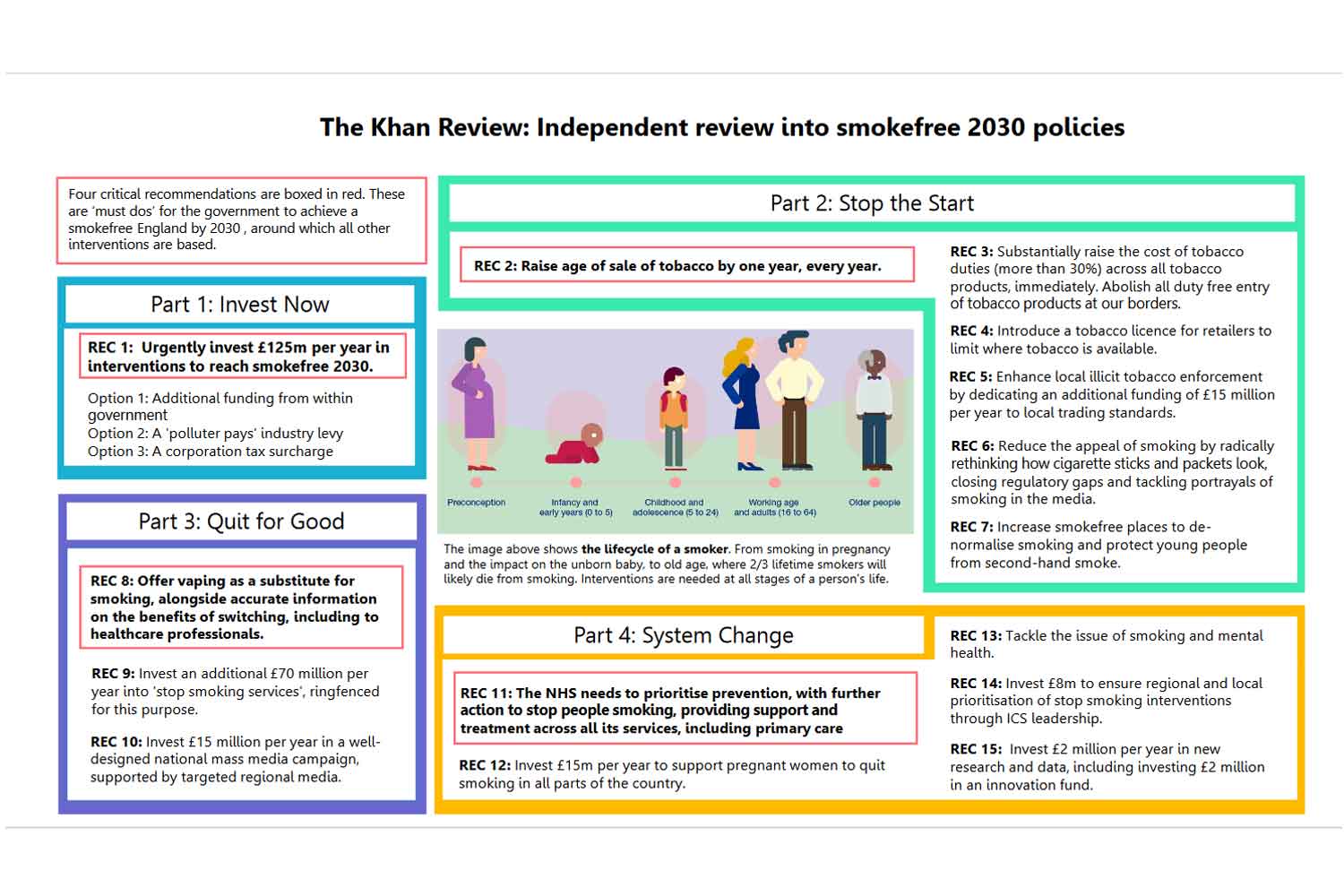U.K. to Consider Khan Proposal for Tobacco Control
- News This Week Regulation
- June 9, 2022
- 5 minutes read

Credit: Nawadoln

The U.K. government said it will consider the recommendations of a report on smoking and publish its own plan in due course, Health and Social Care Secretary Sajid Javid said in a written statement to parliament.
“The independent review will help to inform our upcoming White Paper on Health Disparities, which we plan to publish this summer. To complement this, the department will also be publishing a new tobacco control plan in due course,” Javid’s statement said.
Earlier this year, Javid commissioned an independent review into ways the government can help more people quit smoking and live healthier lives, led by Javed Khan, former CEO of children’s charity Barnardo’s.
That review was published today. The key recommendations are:
- Increased investment of an additional £125 million ($156.66 million) per year in smokefree 2030 policies, with an extra £70 million per year ringfenced for stop smoking services
- Raising the age of sale from 18 by one year every year, until eventually no one can buy a tobacco product in this country
- Promotion of vapes as an effective “swap to stop” tool to help people quit smoking
- Improving prevention in the NHS so smokers are offered advice and support to quit at every interaction they have with health services
Other interventions recommended in the report include a tobacco license for retailers to limit the availability of tobacco across the country; a rethink of the way cigarette sticks and packets look to reduce their appeal; and a mass media campaign to encourage smokers to quit.

Creeping prohibition won’t stop young adults smoking. It will simply drive the sale of tobacco underground and consumers will buy cigarettes on the black market where no-one pays tax and products are completely unregulated.
“My proposals are not just a plan for this government, but successive governments too,” said Khan. “To truly achieve a smokefree society in our great country, we need to commit to making smoking obsolete, once and for all.” The U.K. aims having 5 percent or fewer smokers by 2030.
Smokers rights activists condemned the proposal to raise the age of sale of tobacco.
“Creeping prohibition won’t stop young adults smoking. It will simply drive the sale of tobacco underground and consumers will buy cigarettes on the black market where no-one pays tax and products are completely unregulated,” said Simon Clark, director of the smokers’ group Forest.
“Ultimately this is about freedom of choice and personal responsibility and ministers must think very carefully before they adopt prohibition and coercion as tools to achieve their smoke-free goal.”

Mr. Khan unambiguously states that one of the critical ways the government can get its ambitions for a smoke free society back on track is through greater promotion of vaping.
Tobacco harm reduction activists welcomed the report’s recognition of vaping as a tool to help smokers quit.
“We couldn’t agree more with this report’s stark message for the government, which is that, without immediate action, it will miss its smoke free targets by seven years,” said John Dunne, director general of the U.K. Vaping Industry Association, in a statement.
“The NHS [National Health Service] tells us that around 78,000 people in the U.K. die every year from smoking, with many more living with debilitating smoking-related illnesses, so the time for inaction is over.
“Mr. Khan unambiguously states that one of the critical ways the government can get its ambitions for a smoke free society back on track is through greater promotion of vaping and the UKVIA, which represents vaping organizations including retailers, manufacturers and distributors, will do everything we can to support this.”
Clark noted that encouraging smokers to switch to reduced risk products such as e-cigarettes is sensible “as long as it is voluntary and based on educating consumers about the relative risks of different nicotine products.”
